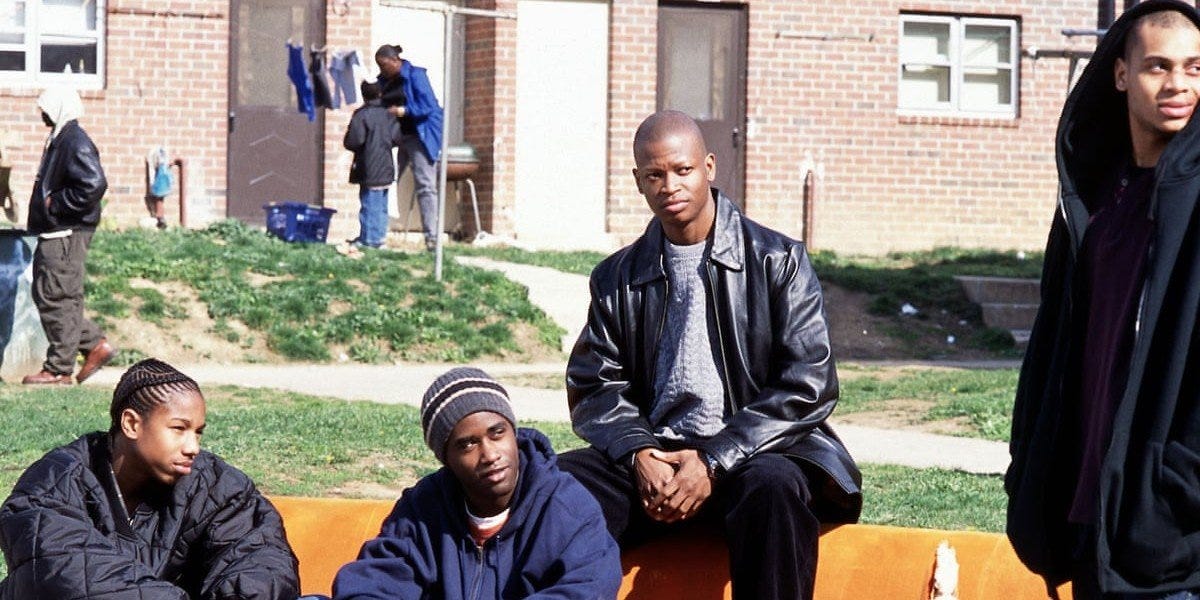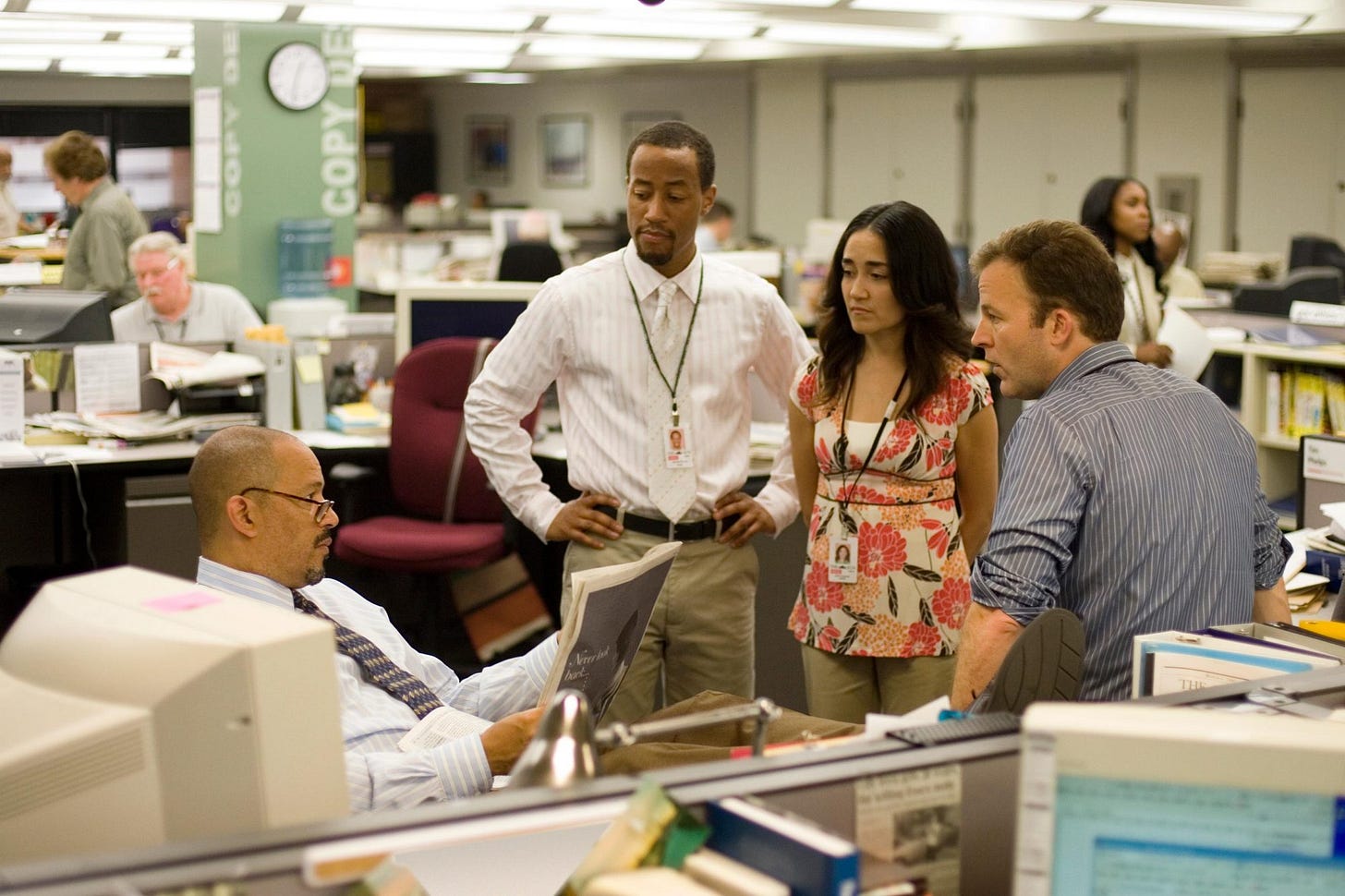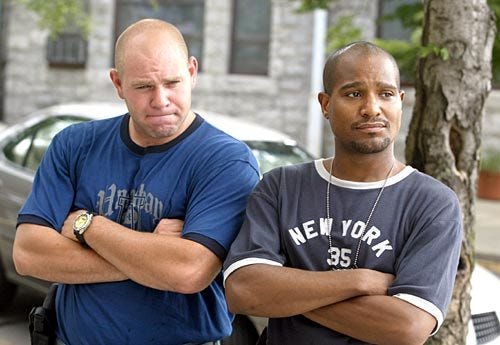So, at long last I’ve finished my countdown of my favorite TV shows, and at the very top of the list is The Wire. I’m far from the only person who has this as the best show ever, and as such any insights here are going to likely not be original. But, as I started this project, I started a re-watch of the show I knew would be on top, and my god, it’s even more brilliant when you re-watch it (this is now the third time I’ve seen the entire series).
I already did a recap of why it’s my favorite show, but this is more of an exploration of what makes it truly great. Because I do think that there are some things like this that are truly transcendent. Warning to anyone wanting to read a massive tome on a show they haven’t seen yet - THERE BE SPOILERS HERE.
There’s a quote in the show by Lester Freamon (Clarke Peters) that “all the pieces matter.” He’s talking about connecting the dots in a major crimes bust, but it applies here (and is why the quote was lifted for an excellent oral history about the book as well.) And it’s really the whole of The Wire that makes it such a masterpiece.
I broke down the highlights of the seasons plots in my prior post, but they’re so critical to the story being told that the show wouldn’t have worked without at least all five seasons. We see the guys selling drugs and the cops who are sort of busting them and sometimes just harassing them, audibly or physically, but we don’t get how inevitable being “in the game” is for kids growing up there until we see the schools in Season 4. We see how the economic choices the city makes collapses blue collar industry, creating opportunities for gangsters and criminals to enter those worlds out of a lack of other choices. (And we see strongly that the problems of the city of Baltimore aren’t limited to black folks living in the projects.) We see the police obsessed with quotas and numbers, and the choices their direct reports must make to keep their jobs - even if those choices leave the worst offenders out on the street. We see those quotas met through innovative drug program choices (creating a legal safe zone, Hamsterdam) but we also don’t understand the true horror of that until we see the zombie-like blocks of heavily drugged out addicts sprawled out on city blocks. And while we see those addicts copping drugs, including Bubbles and his mates, we don’t really understand their suffering until we see Bubbles walk up those steps.
How broken are things? The cops in the Western District are focused - theoretically - on the drug war. Yet, their approach is so minor - they choose to “rip and run,” get the lowest level dealers on small charges to make their quotas. They have never heard of the Barksdale Crew, let alone Avon Barksdale (Wood Harris) who controls the most of the territory they patrol. What’s more, they seemingly never thought to ask who was running things.

Things are so messed up that when Bunny Colvin (Robert Wisdom) gets punished more for his actions than Clay Davis (Isiah Whitlock) does, it feels both horrific and completely plausible. The fact that some of the kids like Namond DO get a second chance and a bright future also seems plausible, but only in a real-heroes-do-exist kind of a way.
The media story in the final season seems antiquated now in 2022, in the way we all consume (or ignore) the news, but again the paper is already bleeding and desperate for awards and sexy stories. They ignore obvious signs that a reporter isn’t sourcing stories right, or that the details are just too convenient. And in fact, there is no serial killer - but McNulty is trying to create one in order to get needed police resources. It’s … insane.
When Tommy Carcetti (Aidan Gillen) gets elected to be Mayor, he - presumably, like many before him - says he doesn’t want the police to “juke” their stats. They won’t solve the crime problem by covering it up, they need to get the stats down the right way, by solving crimes, and reducing them.
That changes almost immediately. And in Season 5, when Carcetti has already set his sights on becoming Governor, his team ousts the Police Commissioner Burrell (Frankie Faison) and installs Cedric Daniels (Lance Reddick) who we’ve seen since Season 1 leading the Major Crimes Team through ups and downs. Carcetti’s team not so subtly hints that they need to see better stats so that Carcetti can have a shot at becoming Governor.
Daniels isn’t having it:
I’ll swallow a lie when I have to. I’ve swallowed a few big ones, lately, but the stat game? That lie? That’s what ruined this department. Shining up shit and calling it gold so Majors become Colonels and Mayors become Governors, pretending to do police work while one fucking generation trains the next how not to do the job.
David Simon has often said that The Wire is really a portrayal of Baltimore, not any true characters, etc. And what I think he means here is that it’s about of how everything is broken, that there is true systemic decay. The politicians think in short term measures, which fixes nothing. The police have to “solve” cases through short cuts, which leads to them hiring guys who are more interested in beating up “hoppers” the “Western District Way” and clearing cases by any means necessary.
The schools are hampered by a lack of support at their kids homes, a financial system that requires kids only attend one school day per month, and so forth. They need to teach to the test, which solves nothing. As Bunny Colvin says:
“You put a textbook in front of these kids, put a problem on the blackboard, teach them every problem in some statewide test, it won't matter. None of it. 'Cause they're not learning for our world; they're learning for theirs. They know exactly what it is they're training for and what it is everyone expects them to be. It's not about you or us or the test or the system. It's what they expect of themselves. Every single one of them know they're headed back to the corners. Their brothers and sisters, shit, their parents. They came through these same classrooms. We pretended to teach them, they pretended to learn and where'd they end up? Same damn corners. They're not fools, these kids. They don't know our world but they know their own. They see right through us.” — Bunny Colvin, “Misgivings”, The Wire, Season 4
In re-watching the show, in some ways you can tell the story of it through two characters - Ellis Carver (Seth Gilliam) and Thomas “Herc” Hauk (Domenick Lombardozzi). In Season One, they are paired together and good friends who have walked the beat together. They seem to see the world the same - memorably, they drive into the projects late one night after drinking to roust the ‘hoppers’ as a show of force. They relish in the “Western District Way” which rewards brawns over brains.
But, as the show goes on, we see them take different paths. Herc is sloppy and selfish. But he’s not an idiot - we know he does better on his sergeant’s exam than Carver, for instance. But he takes shortcuts, and hurts folks by doing so. He forgets to bring Randy (Maestro Harrell) over to Bunk (Wendell Pierce). He later recklessly tells another kid from the streets that Randy was his source - which ends up getting Randy seen as a snitch by his community, a life changing event for Randy in the worst way. He lies about a fake informant to cover his tracks for a lost listening device and when he leaves the force, he happily joins up with gang-lawyer Maurice Levy (Michael Kostroff), even informing Levy about his old friends behaviors and actions which kneecap his old squad. Herc doesn’t seem to have any misgivings about what he’s doing to the community, he just revels in the praise he gets from Levy and the same gang members he was trying to put behind bars just months beforehand. In short, Herc SUCKS.
Carver, on the other hand, is on that same bad track. He gets caught up in the politics of the police, leaking information on Daniels in return for a promotion - but Daniels is good enough to see where Carver CAN go. And even as he’s telling Carver exactly what he knows went down, he dispenses advice that seems to change Carver forever:
Couple weeks from now, you’re gonna be in some district somewhere with 11 to 12 uniforms looking to you for everything. And some of them are gonna be good police. Some of them are gonna be young and stupid. A few are gonna be pieces of shit. But all of them will take their cue from you.
You show loyalty, they learn loyalty. You show them it’s about the work, it’ll be about the work. You show them some other kinda game, then that’s the game they’ll play. I came on in the Eastern, and there was a piece-of-shit lieutenant hoping to be a captain, piece-of-shit sergeants hoping to be lieutenants. Pretty soon we had piece-of-shit patrolmen trying to figure the job for themselves. And some of what happens then is hard as hell to live down.
Comes a day you’re gonna have to decide whether it’s about you or about the work.
And indeed we see Carver becoming an honest to goodness real police - he’s part of the community, he knows the residents and treats them like people. He can’t fix everything, the problem is way bigger than him - but he does the right thing when it matters and his district is better because he’s there. (He even ‘breaks the code’ by writing up an incident of police brutality, and gets shamed for it by many men on the team, something that feels ripped from todays headlines to all of our regret.)
Carver decided it was about the work; Herc decided it was about him.
Finally, one thing to take away from this masterpiece of a show is that there IS hope, even if it’s slim. Namond (Julito McCullum) gets away from his horrible mother and we see him shining with the Colvins. Poot (Tray Chaney), a low-level hopper who seemed destined to be another body (and almost was), leaves the corner and starts working at a Foot Locker, making his own path.
And of course, there’s Bubbles (Andre Royo). Bubbles is an addict but we know from Season 1 he has a big heart, he’s funny and he’s also willing to help the police as an informant when he sees what’s happening to the neighborhood (even if his addiction is part of it). Bubbles goes through true tragedy and nightmares that extend past his addiction. His sponsor (the unbelievably good Steve Earle, taking a break from music) sees his struggle, but Bubbles has to do this on his own. And he does.
To some degree, I wish the series had ended with Bubbles walking up the stairs to eat dinner with his sister and her family, having finally earned her trust and gotten himself right. But then, that wouldn’t be honest either … this isn’t a show about happy endings.
The Wire was made in the early part of the 21st century, and some things really reflect this - text messaging, for example, is a new thing the detectives realize the dealers are using very late in the game. But the things that make the show important transcend time (and are sadly as relevant as ever). I know several people who have just never gotten around to watching this show, and that’s a genuine misstep, whether you consider yourself a TV fan or not. It’s truly brilliant. It’s truly a work of art, and highly worthy of the praise it has earned.












Great stuff! I totally agree that it gets better with a rewatch. Maybe with each successive rewatch, if you give it time. Just watched it again for the fourth time, I think, earlier this year and loved it more than ever.